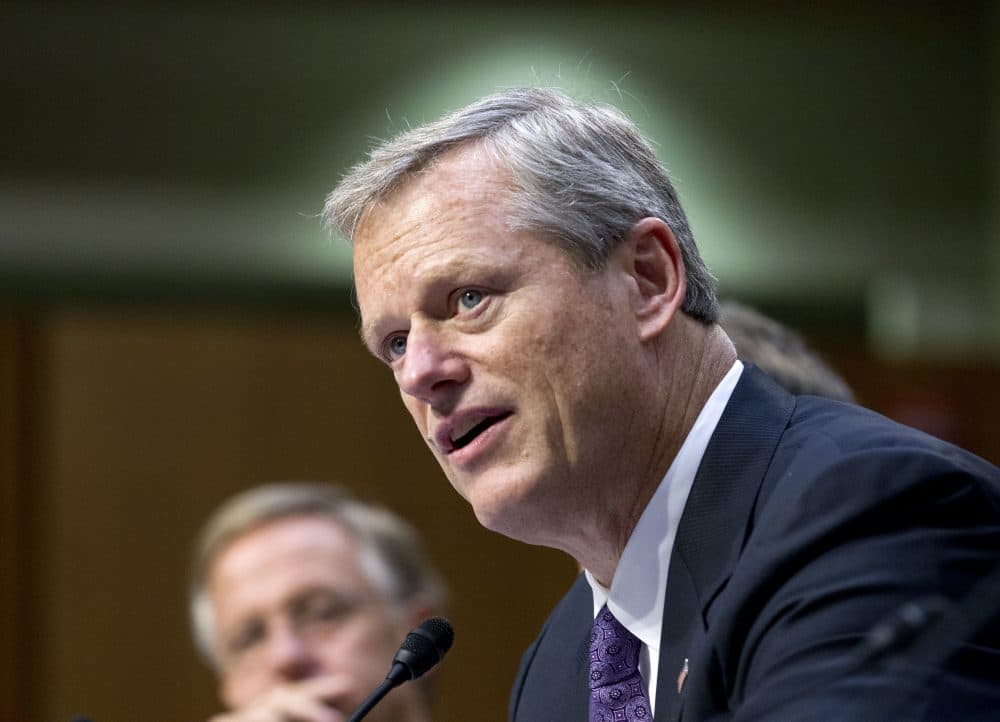Advertisement
Mass. To Ensure Social Workers Set To Fight Opioids

Gov. Charlie Baker has unveiled what he's calling a "first-in-the-nation set of educational core principles" for social workers on the front lines of the battle against opioid abuse, which has claimed thousands of lives in Massachusetts.
The Republican said Tuesday that nine schools of social work have agreed to use the principles in their curriculum.
He said that will help ensure that the more than 4,000 social work students enrolled in Massachusetts are equipped with the skills needed to confront the problem of addiction to opioids like heroin and fentanyl.
The agreement comes two years after Massachusetts became the first state to also require that medical and dental schools train students in substance misuse prevention.
The social work schools include Boston College, Boston University, Bridgewater State University, Salem State University, Simmons College, Smith College, Springfield College, Westfield State University and Wheelock College.
Recognizing that social workers are the largest force on the front lines of the opioid crisis, Baker said the program will make them far more helpful in assisting people and families dealing with the issue. He says the goal is to make it part of training for all social workers.
"The most important thing we need to do here is get everybody to understand and accept that they have a role to play in this, and not simply the purview of those who might choose to enter a field or a space where you might see more of this because as we've said before, this is everywhere," Baker said.
The governor said that as part of the agreement, each of the nine schools of social work will incorporate addiction education and training guided by the core principles.
Those principles include being able to demonstrate an understanding of prevention techniques and strategies; assessing a person's risk for substance use disorders; showing an awareness of how to inform individuals about the risks associated with substance misuse; eliminating stigma; and recognizing substance use disorders as a chronic disease that affects individuals and families physically, mentally, spiritually and socially.
"Almost every front-line social worker will engage with a client struggling with substance use disorder or a family with a loved one struggling over the course of their career," said Secretary of Health and Human Services Marylou Sudders. "They must be equipped with the best clerical tools to help clients navigate a path to treatment and recovery."
Sudders said this is a change from how schools had previously approached substance use.
"Often the treatment of addictions has been a specialty rather than sort of core to your training as a social worker. And we know that that's very important because we know that addictions can affect any individual and has a tremendous impact on families," Sudders said.
The announcement comes as there are tentative signs the state may be gaining ground in the fight against the drugs.
Public health officials said in August that the number of opioid-related deaths fell about 5 percent in the first six months of 2017 compared to the same period last year.
The decline is modest: 978 estimated and confirmed deaths in the first half of 2017, compared to 1,031 estimated and confirmed deaths during the first half of 2016.
Despite the decline, the report said the presence of fentanyl in opioid-related deaths continues to climb, even as the presence of heroin in such deaths continues to drop.
Overdoses that don't result in death also continue to be a challenge with the state experiencing more than 65,000 non-fatal overdoses from 2011 to 2015.
With reporting from Steve LeBlanc of The Associated Press and WBUR's Steve Brown